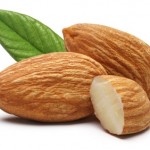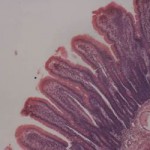Dear Dr. Ray: I keep hearing that I should be taking a fish oil supplement, and that there are healthy fats that are important for me  to consume. Which fats are these? How much should I be getting each day?
to consume. Which fats are these? How much should I be getting each day?
Dear Reader: The shortest answer I can give you is that the only healthy fats to consume are those found in whole foods. This means raw nuts and seeds (whole – not the oil from those nuts and seeds), avocados, coconuts, etc. And even these should be eaten sparingly, treated as condiments for the most part.
And here’s a longer answer:
If you look at the main function of the small intestine, and the whole purpose of eating for that matter, you realize that it is all about the absorption of nutrients: 17-35 feet of tubing dedicated to absorbing phytonutrients, essential fats, amino acids, and carbohydrates, so you can live a healthy and vital life.
And the surface is not smooth, but rather covered with thousands of villi in order to maximize the surface area for absorption. As the  villi are delicate, they are constantly being replaced. This repair and maintenance is expensive for the body in terms of utilizing available water, carbohydrates, protein, and important fats. Yet the body chooses this expensive repair of the villi constantly as it is a priority for the body to absorb nutrients from the food we eat. Are the food choices we make in alignment with this priority?
villi are delicate, they are constantly being replaced. This repair and maintenance is expensive for the body in terms of utilizing available water, carbohydrates, protein, and important fats. Yet the body chooses this expensive repair of the villi constantly as it is a priority for the body to absorb nutrients from the food we eat. Are the food choices we make in alignment with this priority?
Indulge me for a second and imagine the grease on your on a pan after a particularly fatty meal preparation. Also imagine what would happen if you never used soap and a scrub brush to wash it off, but let it pile up each time you cooked.
Okay, each time you eat isolated fat (butter, butter substitutes, fish oil, flax oil, olive oil, coconut oil, DHA, EPA, you name it), these oils begin to coat those precious villi and there is no soap or scrub brush to wash it off. To make matters worse, other poor food choices (such bits of sticky food made from flour, chips, crackers, cheese etc.) pass by this grease coating. Now you literally have tar build up totally blocking the villi, and the body cannot absorb nutrients efficiently at all through the tar layer.
This is the exact predicament that causes everything from aging skin to serious illness. This is what I work on at the retreat to dissolve. This is also the major reason some people cannot make the transition to a healthy diet simply by a change of food choices. They become convinced they are carnivores because they feel better when they eat meat, and they think it’s because they need protein. Since calorie per calorie, plants provide the same amount of protein, that assumption is wrong. The main reason is a twisted one: the meat causes constipation as it slows down the rate at which food travels through the intestine, and this allows the body to absorb some nutrients. However, creating constipation is not a good long term solution to the real challenge at hand. We have to eliminate the tar as well. This is why I talk about the importance of enemas in my book. At my retreat, we work to dissolve this tar layer. A healthy body does not produce hard stools, which are an indicator of constipation, whereas smooth, easy bowel movements are a good indicator of a functioning digestive system.
Consider this: does a Giraffe coat the leaves he is eating with olive oil for better health? Why do we ruin a perfectly good plate of leafy greens with a coating of oil which will also make it difficult for digestive enzymes to recognize the food for what it is?
Whole food is the key. Isolated fats are just that: isolated. Just like we understand that isolated sugars are not a good thing, we will slowly come to understand that isolated fats are not a good thing either. Nor are isolated proteins but that is the topic of another newsletter.
Finally, here’s a link to my 2008 article about good fats vs. bad fats, which contains some additional information.
